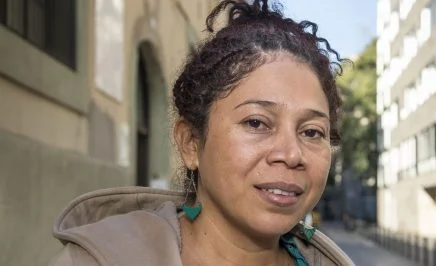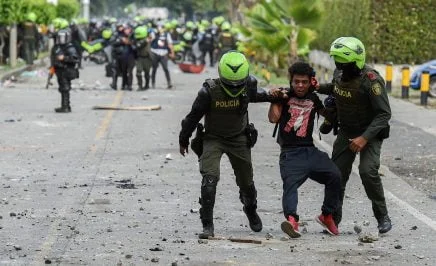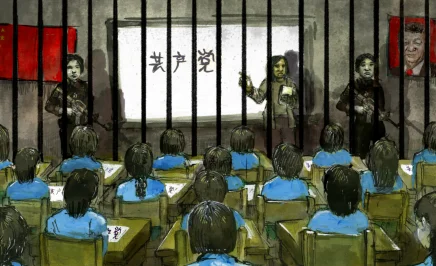The practices described in the new report Cali: In the epicentre of repression (the report is currently only available in Spanish, this link will be updated when the English version is available) – which include the use of lethal weapons against protesters, excessive and unlawful use of less lethal weapons such as tear gas, unlawful detentions and torture – are representative of hundreds of reports by protesters and human rights defenders and organizations and illustrate the modus operandi implemented throughout the country, Amnesty International said today.
“The Colombian authorities violated the human rights of peaceful demonstrators in Cali, using excessive and unnecessary force to disperse them. Under the pretext of restoring order, terrible injuries were inflicted on hundreds of people and dozens of young people lost their lives. What happened in Cali shows the violent response of the authorities and the true objectives behind this repression: to instil fear, discourage peaceful protest and punish those demanding to live in a fairer country,” said Erika Guevara-Rosas, Americas director at Amnesty International.
The city of Cali, capital of the department of Valle del Cauca, is in one of the regions hardest hit by the internal armed conflict and where various armed groups have proliferated and continue to operate, resulting in thousands of people being displaced and killed. It is the city with the second largest Afro-descendant population in Latin America and is characterized by inequality, exclusion and structural racism. This context contributed to Cali becoming the epicentre of protests and human rights violations during their repression.
Since 28 April, mass demonstrations have taken place in Cali, in the framework of the “National Strike”. It was the city that saw the greatest concentration of the most serious reports of violent repression of young protesters by the security forces and armed civilian groups, and the authorities are continuing to restrict the right to peaceful protest.
Amnesty International carried out an exhaustive digital verification of audiovisual material, which confirmed that National Police officials, in particular members of the Mobile Anti-Riot Squad (ESMAD), used excessive and unnecessary force. The organization also documented acts of urban paramilitarism by armed civilians, who accompanied National Police officials and, acting with their acquiescence and tolerance, attacked demonstrators and human rights defenders.
The report analyses three cases of human rights violations in Cali. The first took place on 3 May, when, in an incursion called “Operation Siloé”, National Police officers, together with members of ESMAD and the Special Operations Group of the National Police of Colombia (GOES), used lethal weapons, including Tavor 5.56mm rifles, against peaceful protesters. That night, at least three deaths from gunshot wounds were recorded, among them that of the young man Kevin Agudelo, and hundreds of people were injured and several arbitrarily detained.
The second incident detailed is the attack on 9 May on the Indigenous Minga (a collective of Indigenous Peoples participating in the protest) by armed civilians as National Police officers looked on. On that day, 11 Indigenous people were injured, including the Indigenous human rights defender Daniela Soto.
The third and final case centres on the events that occurred on 28 May, when National Police officials used excessive force in an attack, in coordination with armed civilians, on demonstrators in the neighbourhood around Valle University. On that day, a dozen young demonstrators, including Álvaro Herrera, Noé Muñoz and Sebastián Mejía, were beaten and detained by armed civilians, who then handed them over to the National Police. Álvaro and Sebastián alleged that they were subjected to torture and cruel and inhuman treatment during their unlawful detention.
In the case of Siloé, the unlawful and excessive use of tear gas – including against peaceful protesters who had nowhere to disperse to – involved the use of Venom, a system that is not appropriate for use in law enforcement operations.
The incidents documented were not isolated or sporadic, but rather reflect a pattern of violence on the part of the Colombian authorities, who have responded to the protest with stigmatization, criminalization, unlawful police repression and militarization. When President Iván Duque decreed the use of the military in several cities in the country, including Cali, on 28 May, far from giving a message of dialogue, he fuelled protests by sending military units shaped by more than six decades of armed conflict onto the streets.
In response to the announcement of the 20 July mobilizations and the holding of the National People’s Assembly, made up of people, groups and movements involved in the National Strike, in different cities in the country, including Cali, the Valle del Cauca government issued measures restricting the movement of transport and/or people entering the department between 16 and 22 July, thereby restricting the right to peaceful protest.
The report highlights the recent observations of the Inter-American Commission on Human Rights (IACHR) following its visit to Colombia and calls on the state to comply with its recommendations and cooperate with and not hinder the work of the IACHR’s recently created Special Monitoring Mechanism for Human Rights in Colombia.
The report urges the Colombian authorities to promptly issue an unequivocal order to stop the violent repression by the security forces. This includes a ban on the use of lethal weapons to disperse crowds and the use of tear gas against peaceful assemblies and/or in a way that risks causing excessive and unjustified harm – in accordance with the 30 Rules for the use of chemical irritants in law enforcement published by Amnesty International this week.
Likewise, thorough, independent and impartial investigations must be initiated into human rights violations and crimes under international law committed in the context of the National Strike, specifically, in the city of Cali and the cases detailed in the report, taking into account all chain of command responsibilities within the security forces, as well as the participation of armed civilians with their acquiescence. Impunity must not prevail for these serious crimes.
On 12 July, Amnesty International requested information on the three cases documented in the report from the Minister of Defence, the Director General of the National Police and the Attorney General, with a view to receiving their comments within 10 days and including them in the report. On 23 July investigative judge 158 of the military jurisdiction sent a response regarding investigations initiated in that jurisdiction. As of 23 July, the closing date of the report, no response from the other authorities had been received.
On 19 July, President Duque publicly presented “the process for comprehensive transformation of the National Police” which, he claims, has as its pillars the prioritization of a human rights perspective. Despite this announcement, on 20 July Amnesty International received reports that members of ESMAD used unlawful force during protests in Bogotá, Barranquilla, Cali and Medellín, injuring several protesters.
“Amnesty International hopes that the police reform process announced by President Duque is not merely a paper promise, and that it includes the reforms ordered by the Supreme Court of Justice in September 2020 and a change in the repressive modus operandi of the National Police against the peaceful demonstrations,” said Erika Guevara-Rosas.




